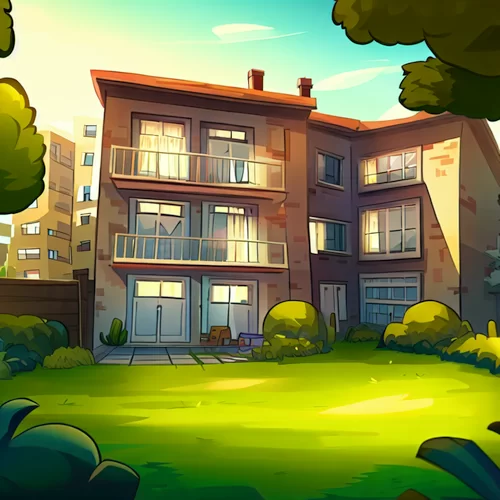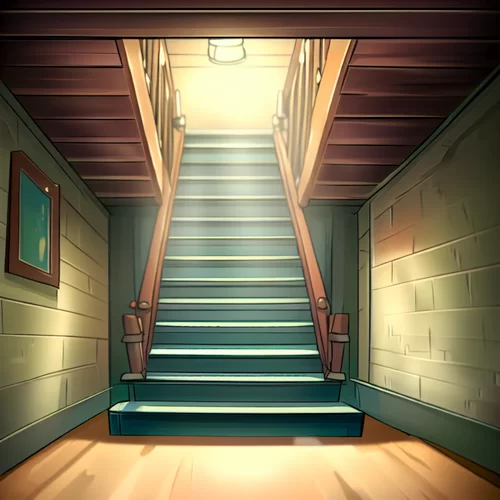
Where in the UK are basement flats?
Basement flats are fairly common in the UK. They’re especially in older homes in cities like London, Bristol, and Edinburgh.
In London, for example about 30% of all homes have a flat in the basement or on the ground floor. Some people also like to call them garden flats or lower-ground floor flats.
What’s great about living in basement flats?
Solid floors to work out on
One benefit of a basement flat on a solid floor is that nobody is underneath you! This means no worries about noise travelling to any neighbours below.
Solid floors can also help to keep the temperature in a room more stable and even throughout the year. Solid floors have a higher thermal mass than suspended wood floors – so they can absorb and store heat during the day and slowly release it at night, which helps keep the temperature more stable.
No worries about the roof
When you live in a basement flat, you’re less likely to be affected by problems with the roof that can happen in other parts of the building.
Since a basement flat is below the upper floors, it’s less likely to have issues like leaks, falling branches from trees, or general wear and tear.
Access to a communal garden

London Victorian houses with basement flats often have direct access to the garden, which can be a big plus for the people who live there.
Since many Victorian houses were built with a basement level, basement flats are often in the back of the house, with a door that goes right out into the garden.
This can be especially appealing to people who like to spend time outside because it gives them a private outdoor space that is easy to get to and can be used to relax, entertain guests, or grow plants. Having direct access to the garden can also help people feel more connected to the natural world, which can be good for their mental health and well-being.
Also, having access to a garden can be especially helpful for people who live in cities, where it can be hard to find green spaces and a bit of a walk to parks.
Risks of buying a basement flat
Basements don’t get much light
Since a basement is below ground level, it doesn’t get much natural light from above, which can make it feel dark and gloomy.
But some basement flats may have windows or other openings on the ground floor that let light in. These can be in the front or back of the property, or they can be built into light wells or other features meant to let in as much natural light as possible.
Even though windows at ground level can help bring in natural light, it’s important to remember that a basement flat will still get less light than a flat above ground.
So this can change the mood and well-being of the people living there, as well as the overall feel of the living space.
But there are several ways to enhance natural light in a basement flat. For example, walls that are light in colour, mirrors, and lights that are strategically placed can help reflect light and make a room feel brighter. Also, choosing light coloured furniture and decorations can help the room feel airy and open.
Just be aware that if you are someone who needs a lot of natural light in their basement flat, you may need to do some work to be comfortable living in one.
Living in basements during Winter
Because they are below ground level, basement flats tend to be colder in the winter than flats above ground. The ground can take longer to heat than wooden floors in flats above, so basement flats can feel cold even when the heat is on.
Also, since heat rises, the upper floors of a building can use the leftover heat from the lower floors, while basement flats can’t use this heat. This means that basement flats may need more heat than other parts of the building to get the same level of warmth.
Basement flat damp
Because they are below ground level, basement flats are more likely to have damp problems than flats above ground. When moisture from the ground gets into a building’s walls or floors, it can cause dampness. This can lead to problems like mould growth, musty smells, and the breakdown of building materials.
Damp problems in basement flats can be caused by a number of things, such as poor ventilation, lack of insulation, and water getting in through cracks or gaps in the walls or floors. The risk of dampness can also be higher if the property is in an area with a high water table or that is prone to flooding.
Basement flats can have problems with dampness, but it’s important to remember that not all properties will have this problem, and the level of dampness can vary depending on a number of things.
The likelihood and severity of damp problems can be affected by things like the age and construction of the building, the location and condition of drainage systems, and the quality of maintenance and repair work.
Basement stairs

Some basement stairs are steep and narrow, making them hard for some people to get up and down. This is especially true for older people of those who have trouble moving around.
The angle and lack of space on steep basement stairs can make them hard to climb. This can make it hard to keep your balance or carry things up and down the stairs. Also, the lack of handrails or uneven steps can make it more likely that someone could fall.
There are a few things that can be changed to make basement stairs safer and easier to use. Some basements might have handrails on both sides of the stairs. Others have lighting in the stairwell to help with access.
Less privacy
Most windows in basement flats are at or close to ground level, which makes it easier for people to look inside. Also, if the windows don’t have blinds or curtains, people walking by may be able to see inside, which can make it less private.
This issue can be fixed fairly easy though. A good set of blinds or curtains on the windows can help so that people outside can’t see inside.
Flooding Risk
Basement flats do come with one main risk – flooding. If your property is situated on a flood plain or area at risk of flooding, you should think carefully about buying a property on the street.
The London mayor has previously made vocal announcements about the flooding risks to basement flats in London.
